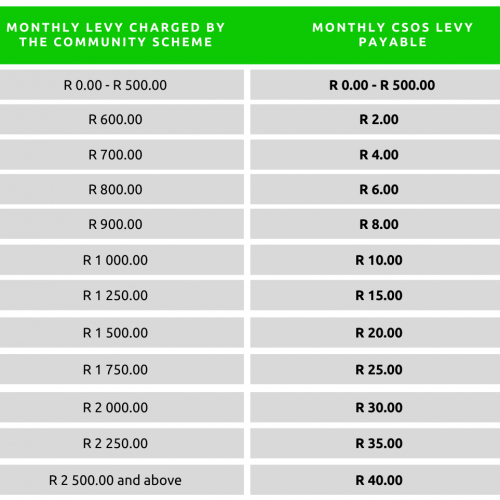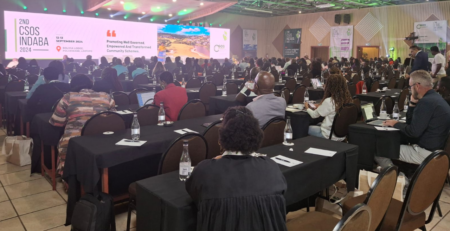The ins and outs of paying CSOS levies and why it matters
If you are living in a community scheme you are most certainly aware of the Community Scheme Ombud Service (“CSOS”) which was established in 2016 alongside the enforcement of the Community Schemes Ombud Service Act 9 of 2011 (“CSOS Act”).
The purpose of the CSOS Act includes:
- The provision of a dispute resolution mechanism for community schemes
- The promotion and monitoring of sound governance of community schemes
- Raising awareness of the rights and obligations of people within a community scheme through education, information, services and relevant documentation
People living in a community scheme share the use and responsibility for parts of the land and buildings situated in their community scheme. Due to the shared use and responsibility, conflict often arises on matters involving finances, governance, behaviour, management etc. Historically, unit owners had arbitration or court proceedings as their only legal recourse to address their complaint and/or dispute which, majority of the time, ended into a lengthy and very costly affair. Now, CSOS is there to resolve these community scheme disputes independently, efficiently, and cost-effectively.
To fund the vital services of CSOS, all community schemes need to pay a levy as stipulated in section 29(1)(b) and 59(a) of the CSOS Act and its Regulations.
Who is responsible for the payment of CSOS levies?
All community schemes within South Africa are obligated to collect CSOS levies from each unit owner within their community scheme.
CSOS published a practice directive (No 3 of 2017) which confirmed that the following category unit owners can apply to be exempted from paying this CSOS levy:
- An owner of an individual unit where the community scheme levy does not exceed R500 per month
- Where the unit owner receives a SASSA grant
- Where the unit owner is in frail care
- Where the unit owner is in assisted living or mid care living
- A unit owner whose monthly net income is less than R5500
How are the CSOS levies calculated?
The CSOS levy is determined with reference to the existing monthly community scheme levy as charged to individual unit owners by their community scheme. The monthly CSOS levy contribution is calculated as follows:
(Community Scheme levy paid per unit – R500) x 2%
The table below provides illustrative values of the prescribed CSOS levy for each unit to be charged monthly:

When to pay
CSOS levy contributions are collected each month by the community schemes from their individual unit owners (as illustrated above).
In terms of Regulation 11(1) of the CSOS Act Regulations, the community scheme must then pay the collected CSOS levies to CSOS on a quarterly basis. More specifically community schemes must pay their quarterly CSOS levy at the end of March, June, September and December each year.
Non-payment and penalties
Failure to pay CSOS levies and fees has severe financial and legal consequences.
In terms of Regulation 13 of the CSOS Act Regulations, any community scheme which fails to pay their CSOS levy on the due date is liable to pay interest at a rate of 2% per month as prescribed by the National Credit Act, 2005. This could likely lead to a rate of 24% per annum.
In terms of section 34 of the CSOS Act, any person who fails to comply with any provision of the CSOS Act and/or its Regulations is liable, on conviction, to a fine or imprisonment for a period not exceeding 5 years or to both a fine and such imprisonment. Where a person is convicted for a second or subsequent conviction for an offence, he or she is liable to a fine or imprisonment for a period not exceeding 10 years or to both a fine and such imprisonment.
To avoid being penalised, your community scheme is required to use normal debt collection mechanisms to collect outstanding CSOS levies from their unit owners.
CSOS Practice Directives on Payment of Levies and Fees
1. CSOS Practice Directive No 1 of 2018 - Amendment of the Practice Directive on Payment of Levies and Fees (14-Jun-18)
The CSOS Practice Directive No 1 of 2018 was issued on the 14th of June 2018 and provides amended and more detailed guidelines in respect of the initial Practice Directive (No 1 of 2017) issued on the Payment of Levies and Fees.
In this Practice Directive, you will find the following:
- The difference between a “CSOS levy” and a “Scheme levy”
- An explanation of a community scheme’s obligation to pay the CSOS levy
- The payment intervals of the CSOS levy
- An explanation of the administrative process to be followed by a community scheme for the payment of their CSOS levy (including the reference numbers and banking details to be used for the payment of the CSOS levy)
- Guidelines on how to deal with CSOS levies if you stay in a “scheme within a scheme”
- Confirmation of what will happen if your community scheme fails to pay their CSOS levy
2. CSOS Practice Directive No 2 of 2019 - Amendment of The Practice Directive on Payment of Levies and Fees (01-Aug-19)
The CSOS Practice Directive No 2 of 2019 was issued on the 1st of August 2019 and provides amended guidelines in respect of the second Practice Directive (No 2 of 2018) issued on the Payment of Levies and Fees.
This Practice Directive differs from the one issued in 2018 in that it:
- Amended the email address to be used by community schemes that have not yet been issued with a registration/reference number (paragraph 6.1)
- Added a request that community schemes inform CSOS when they change their managing agent to ensure their receipt statements are sent to the correct managing agent
- Added a paragraph dealing with the waiver of levies (where a unit owner has been exempted from paying CSOS levies)
In need of advice? Our legal advisory solutions provide community schemes and managing agents with expert opinion in the field of Community Scheme Law and Management.
Contact one of our specialist consultants who are ready to help you!





